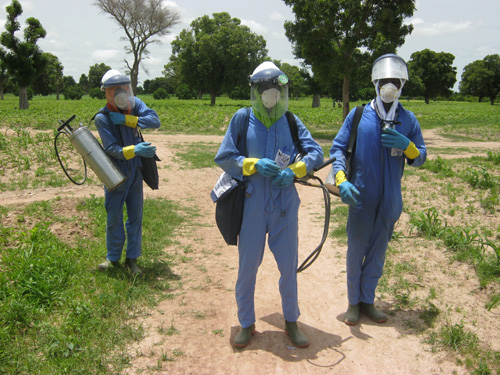 *The PMI VectorLink Mali project closed out on March 31, 2023.
*The PMI VectorLink Mali project closed out on March 31, 2023.
Malaria is the primary cause of morbidity and mortality in Mali, particularly among children under the age of five. The country’s entire population is at risk for malaria, although transmission varies by region. Mali’s malaria control strategy emphasizes universal coverage of key malaria interventions as well as targeted operational research, and specific epidemic and entomological surveillance.
PMI VectorLink Mali, in partnership with the National Malaria Control Program (NMCP), conducted indoor residual spraying (IRS) in four districts in Mopti Region (Bandiagara, Bankass, Djenné, and Mopti) in its first year (2018) to reduce the prevalence of malaria and further reduce malaria-associated morbidity and mortality. From 2019 to 2022, PMI VectorLink continued to implement IRS in three target districts in the region (Bandiagara, Djenné, and Mopti).
The project’s final IRS campaign took place in 2022 in 19 geographically contiguous health areas across the three districts. VectorLink Mali targeted a total of 66,214 structures, spraying Actellic 300CS in Bandiagara, Fludora Fusion WP-SB in Djenné, and SumiShield 50WG in Mopti. From May 30 to July 6, 2022, the project sprayed a total of 72,106 structures out of 73,586 structures found by spray operators in the targeted areas, for a coverage rate of 98%. Through these IRS efforts, PMI VectorLink protected 273,831 Malians against malaria.
Over the course of the project, PMI VectorLink Mali progressively strengthened the NMCP’s capacity to plan, implement, and supervise spray campaigns, as well as use data in decision-making, and collaborated with the NMCP to conduct high-quality entomological monitoring tracking the effectiveness of IRS and the growing resistance of mosquitoes to certain insecticides—to help guide the country’s decision making in vector control strategies. VectorLink also supported the development of a community-led surveillance approach to further strengthen mosquito monitoring efforts.
PMI VectorLink Mali’s conclusion comes at a time when the Malian government is prioritizing the deployment of new-generation insecticide-treated bed nets as the main malaria vector control intervention over IRS. Mali is recognized as a leader in bed net coverage in Africa, with a nearly 200% increase in the number of pregnant women and young children sleeping under a mosquito net since PMI began partnering with the government in 2007.

